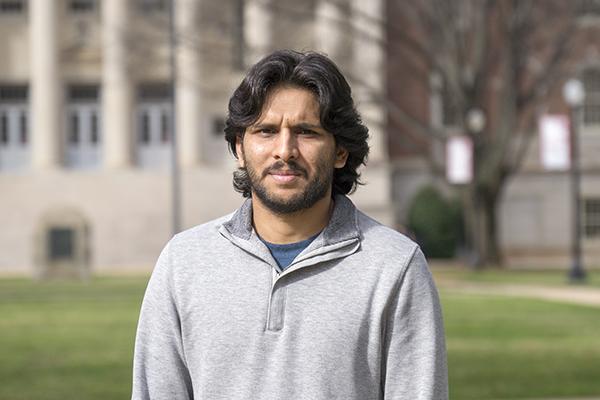Muhammad Farooq, a a graduate student in electrical engineering from Peshawar, Pakistan, is the current president of the Muslim Student Association. Farooq said the organization recently returned to campus with a mission to develop relationships among Muslim students and non-Muslim students.
Q: What is the Muslim Student Association? What’s its background on campus?
A: The organization started back in the ‘90s, but it fell inactive for some time. We restarted the whole thing a couple of years ago. The organization itself is the Muslim Student Association. The big idea is to spread awareness and understanding about Islam, because we have a feeling that not many people know about it, especially here on campus. There is a small Muslim body here in terms of students – probably about 300. We work to meet their needs, provide a prayer space, celebrate various annual festivities. We look to address misconceptions, support students and engage actively in community service.
Q: What interaction exists between MSA and other students on campus, both Muslim and non-Muslim?
A: We work with a lot of different organizations, some religious and some non-religious. We do a lot of inter-faith activities, like for example we work with Crossroads Community Center whose goal is to bring different faiths together through community service. We’ve been involved with that for the past three years. We also work with groups like the Saudi Student Association, the South-Asian Student Association, and the Arabic Student Association for various events and we have an annual gathering for the festival Eid [al-Fitr].
Q: What is your involvement in the organization and some of your own background?
A: Well, I’m originally from Pakistan, so whenever I interact with other students, something that always comes up is religion. People have a lot questions. And I imagined that a lot of other Muslim students go through the same thing. People want to know about our culture and we want to know about theirs, so a few students had the idea to revive this organization so that we could have a much stronger relationship with the community. That’s why I got involved.
Q: What has your experience been as a Muslim student on UA’s campus and how would you describe the experience of other Muslim students on campus?
A: My experience has been great, and I can say that for most of the Muslim students. On the flip-side, there are definitely some incidents. For example, many Muslim females on campus wear Hijabs, the traditional headscarves. And because people sometimes react negatively when they see someone who seems completely different from them, I feel like they face some issues. But overall, it’s amazing. For example, we needed a praying space where Muslim students could congregate and pray on campus and the administration helped us out and now we have a spot in the Ferg. So they’ve been very supportive, I’d say.
Q: How can non-Muslim students interact with your organization to learn more about the Muslim faith?
A: We’re always looking to engage other students and help spread awareness, particularly through inter-faith discussions that we hold. Because not only do we want others to learn about Islam, we want to learn about other religions too.
Q: What’s the future for the MSA? More students? More inter-faith activity? Where do you see yourselves headed?
A: Right, that’s the plan. We have a lot of active students who are looking to spread the message. Recently, there have been lots of events around Islamophobia in the news, and we want to help address those issues so that there are no negative events here on campus, not just for Islam but for any religion or ethnicity. So the goal is to spread awareness, be an active member of the community, especially on UA’s campus, and to help develop a respect for Islam and all other religions.









